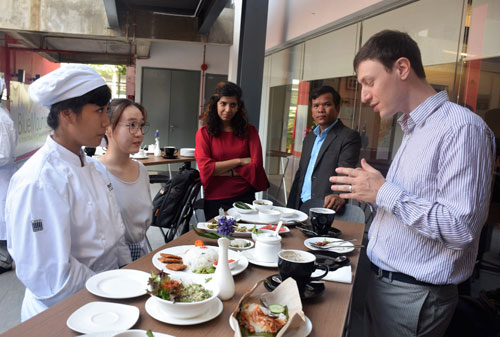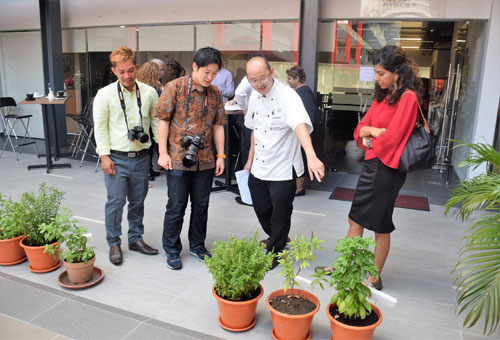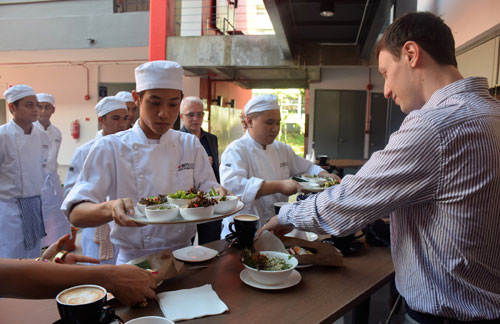At one glance, the array of green leaves and local herbs which sat nestled in their terracotta pots at the front of INTI’s Alkira Restaurant looked like ordinary shrubbery. Often times found growing wildly on the byways or street corners, these leaves and herbs, more commonly known in Malay as ‘ulam’, go unnoticed. On the contrary, they are the unsung heroes that breathe life and pack in a punch of flavors to many Southeast Asian cuisines. While they seem to pale in comparison to more trendy and overly glamorized imported leaves and herbs commonly used in today’s diversely fusion cuisines, INTI’s chef and culinary art lecturer, Chef Eddie Tan is passion driven to bring ulam back to the heart of local cuisines and introduce them on the menus and palates of today’s Gen Y and Gen Z consumers.

(right) Dr. Hart Nadav Feuer, Lead Researcher from Kyoto University giving feedback to students on the use of ulam in their creative dishes with fellow researchers from Malaysia and Cambodia looking on
Chef Eddie, under the supervision of Dr. Eric Olmedo, a principal fellow from Institute of Ethnic Studies of University Kebangsaan Malaysia, is part of a three-country collaborative research focused on intergenerational knowledge transference, which aims to understand the properties and benefits of indigenous plants and bring in age-old knowledge of nutrition to become more relevant for young people today. With the rise of fast food, hectic lifestyles and the sheer diversity of cultural food made available, today’s younger generation are less exposed to the natural and indigenous ingredients which are readily available but not necessarily highlighted in today’s vast array of cuisines.
Led by principal researcher, Dr. Hart Nadav Feuer from Kyoto University, the research which involves Malaysia, Japan and Cambodia is funded by the Toyota Foundation in supporting the researchers’ efforts towards food sustainability and knowledge transference. The Toyota Foundation awards grants to research and projects in a wide variety of areas relating to human and natural environments, social welfare, and education and culture. Chef Eddie, who is part of the Malaysian research team, focuses his findings on urban dwellers and the incorporation of ulam to be palatable to urbanites’ diet.
Recently hosting his research counterparts from Japan and Cambodia at a checkpoint event held at INTI International College Subang, Chef Eddie had the opportunity to share his findings and host a food tasting session with the incorporation of ulam on the menu that were prepared by INTI’s first year culinary arts students.

Chef Eddie Tan (second from right) giving a brief explanation on the properties and flavor profiles of the local plants to his fellow research counterparts
“I feel privileged to be part of this research team to do my bid in raising awareness of the many properties and benefits of these local herbs. Beyond that, I believe getting students involved in the process was a key aspect to this intergenerational knowledge transference project. Having them in the mix allowed us to understand today’s young generations’ preferences in food choices and further gave me the opportunity to expose these students to creating a dish using one of the many local plants. It was interesting to see how they took on the challenge, did research on their own native dishes and practiced in teams to come up with interesting dishes that highlighted the different types of ulam. It was an exceptionally great exposure for these first year culinary arts students to present their dishes to my research counterparts and further explain the usage of ulam, the cooking techniques and other ingredients used to enhance the ulam flavors,” shared Chef Eddie.
What started off as a daunting and impossible feat for the students turned into one of the best lessons in utilizing sensory skills in cooking and creative culinary experiments in the kitchen. With nine out of the ten students not having been previously exposed to ulam in their meals, it was a culinary experience for them in discovering flavor profiles, textures and complementing ingredients to highlight the ulam in their cooking. The students, who come from Indonesia, Pakistan, South Korea and Malaysia, were teamed up and assigned a specific plant to creatively incorporate in a dish that is familiar to their palates while ensuring that the plant remained the star of the dish.
“What I saw was a very beautiful blend of team communication and intercultural communication which allowed the students to take plants that had quite unusual flavoring and use different tricks from each of their cultural backgrounds to try to either cover up the flavors or to complement the flavors in some way. The students really pushed the boundaries on creativity to make the plants edible and I can see them being integrated into menus in restaurants. This exercise is a great way to create awareness and a new legitimacy about these plants not only highlighting that they’re indigenous to Malaysia, but that they also might even represent a core intercultural element of Southeast Asia cuisine. So, as a way of cultural dialogue, I can say that these plants are more fundamental than even language because multiple countries are able to cook those plants or identify the medicinal or botanical values of those plants,” shared Dr. Hart who hopes the findings of this research will impact the lives of today’s generation and well into the future.

First year culinary student, Choi Jung Wook (left) presenting his creative dish to Dr Hart (right) during the food tasting session
The students, who are all in their first year of study in the culinary arts programme at INTI, were appreciative of the opportunity to network with the fellow researchers at the event and gain meaningful feedback on their creative dishes from the guests. Aside from enhancing their culinary skills, the students also used the event as a platform to sharpen their softs skills which include communication, collaboration, creativity and critical thinking.
“This was a very interesting experience for us as most of us had not worked with these plants before and when we drew lots on our plants to use and cook with, it was puzzling because we didn’t know what to do with it at first. After doing our research and consulting Chef Eddie, we finally came up with our recipes which would enhance the flavors of the plant. Having said that, what my team mate and I planned to originally cook didn’t work out and we had to make last minute changes and work things out so we could deliver the right flavors. In the end, it turned out better than we expected so it was a great experience,” shared Choi Jung Wook from South Korea who concluded that the experience helped him work better under pressure, be quick to think on his feet and improve his decision making skills.
Early exposure to industry driven initiatives allows INTI students to get a head start in their careers from the onset of their academic journey. Through events like this, INTI students have the opportunity to sharpen their skills and gain meaningful industry feedback to better prepare for the high expectations and demands of industry in the future.
INTI’s strong industry linkage with over 450 companies has resulted in INTI’s high employability rate in 2015 as validated by BDO Governance Advisory with 98% of INTI graduates being employed within six months of graduation with 82% earning incomes higher than the market average and 25% of graduates receiving job offers even before they graduate.